For anyone interested in the history of Intacct, here’s a great podcast published 10/23/2023 where Sage CTO Aaron Harris explains to Andrew Gelina, Underserved Podcast host, the ups and downs of Intacct, leading eventually to a sale to Sage Group PLC in 2017.
Sage Intacct was founded in 1999 as a cloud accounting system when almost everyone had heavy skepticism about moving confidential accounting data to the cloud. Aaron Harris has been with Intacct since its inception, and ultimately, shortly after Intacct was acquired in 2017 by Sage, Harris was appointed as Sage’s global CTO.
Harris gives a fascinating look at the early days – including how one early marketing tactic involved allowing customers of Intacct to click on a button to actually view a live image of the remote server hosting their data.
Listen to the podcast here or read my summary below.
The History of Sage Intacct
This is my summary of the podcast interview with the current Sage CTO Aaron Harris who gives some background of how he became involved with technology and follows that all the way through the acquisition of his company Sage Intacct by Sage in 2017.
Harris says he got his start on Atari, building a system to track sheet music for piano teachers ( paid $100 by mom)
Harris attended Brigham Young – Masters in IS
While in college, he built an accounting system for the campus design department and a home builder ( mid-1990s)
Built a new Windows-based accounting system for accounting ( competitor was Timberline ) – received second place in this contest.
First place went to aluminum siding pyramid marketing solutions
This received some investment interest which he turned down and shut down the business. Aaron went to Arthur Andersen ( Big Six ) as an IT worker.
His job at Arthur Anderson was to merge technology
Left Arthur Anderson – moved to Silicon Valley – and began working in late 1999 on web-based accounting software. The first full-time engineer at Intacct.
David Thomas came up with the name. Stands for Internet Accounting
PHP on Oracle back-end. They had to explain PHP until Facebook adopted PHP.
Talks about multi-tenancy in the early days when that concept was new and people were tempted to allow one-off customization.
In the early days, the #1 objection was putting accounting on the Internet. To overcome this, they would talk about using Oracle as the back-end database and IBM as their hosting provider. This would be prominently introduced in their marketing material to help illustrate the data’s security. In the early days, they actually had a webcam with “see my data” which showed people a video of where their data was being hosted.
Moving data centers required swapping actual hardware ( drives ), and to do this ASAP, the VP of Operations took these in the saddlebags of his motorcycle to the new data center.
Intacct mirrors the history of Silicon Valley. Venture capital was easy and largely wanted “growth at any cost.” There were some days of hosting ads trying to attract accountants to send QB files, and Intacct would convert it. This didn’t work.
As a result, they cut down to 18 people. Hired a sales representative. Couldn’t afford to keep building in Silicon Valley (too expensive), and they retained the SV team but added India development.
In 2002, while still a small company Intacct had a well-known VC ( Ann Winblad ) so they had some attention (co-develop) with larger companies. One integration was with a customer who wanted ACH, and this was seen as very novel at the time. Once launched, they were called by operations and said that their system had gone down – however, it wasn’t set up to handle UTF-8 files which crashed the ACH system at the bank.
They were growing revenue but were in a “bit of a fire sale situation.” During this time, they met with “obvious candidates” to acquire a web-based software company ( including Sage and Satya Nadella ). Ultimately, no takers thought Sage did make an offer but walked away once they found they couldn’t fit Intacct into Sage’s model.
Brian Jacobs (Emergent Capital ) – new series of funding, new CEO. This began to turn things around though finances were still tight. SaaS was starting to gain some traction, and Intacct started to grow.
Intacct was growing 35% when, in 2008, funding began to slow.
CEO saw this as an opportunity and knew that big software companies would let talent go and therefore choice talent acquisitions would be available.
They went after good engineers to come work at Intacct. Hired 2 of the 3 founding engineers for QuickBooks.
Mike Braun was the CEO (2007 to 2009) and later Rob Reid was CEO (2009 – 2017) for the final 10 years.
In 2017 Intacct again is talking to possible suitors – should they raise more money or take an offer to be sold.
Intacct got a call from Sage. There were several prior conversations, so Harris was a bit reluctant. However, the new Sage executive team under Stephen Kelly ( CEO from 2014 to 2018 ) had a different enthusiasm. Intacct was purchased by Sage in 2017.
For the first few years, Sage left Intacct alone. This allowed Intact to ensure the momentum continued.
The Intacct business still grows 30% a year
Aaron Harris is appointed Global CTO, which he did not expect.
Re-platforming = kills companies ( Sage didn’t do this to Intacct )
Use APIS instead of rewrites
Sage has had AI in products for about five years. Until now, it’s been narrow and task oriented. What changed overnight with AI is ChatGPT which introduced new ways of interacting and chaining together multiple workflows.
AI is no longer hidden – rather it’s spotlighted.
Aaron stopped coding in 2019 when he took the global CTO job. After his first ChatGPT interaction, he had some sleepless nights after seeing ChatGPT. He went hands-on with ChatGPT to familiarize himself with the technology and machine learning.
There are 3,500 developers around the world. The new strategy is to take existing cloud products and make them work in as many markets as possible, whereas the prior strategy was to acquire different products in many other regions.
Much less resistance now to putting data into the cloud. There is no longer a need to get on sales calls and convince customers of the safety of their data in the cloud. However, there are still questions such as “What are your approaches to intruder defense?”.
One big vertical is now financial services. They are now winning all the big family offices ( managing money ). Intacct is still very much focused on speeding up the monthly close.
Aaron Harris has been with Sage for about 23 years, a lengthy term. Aaron says that his longevity is unique. About 50% of his success he attributes to just showing up and not quitting.
Listen to the full podcast episode here




